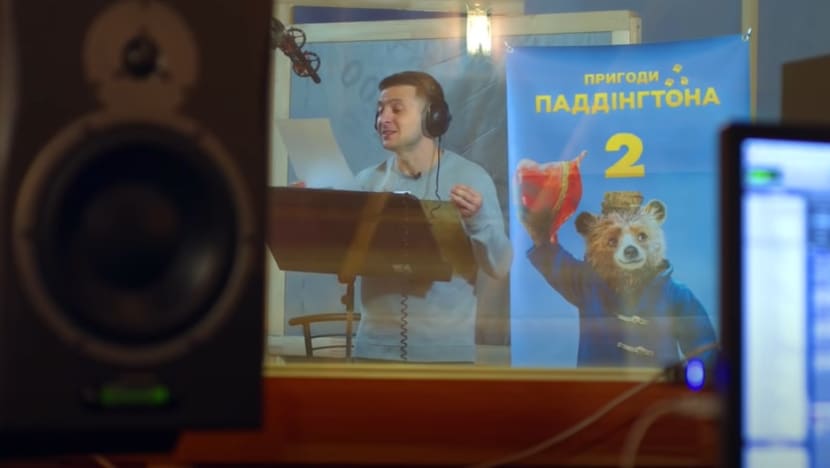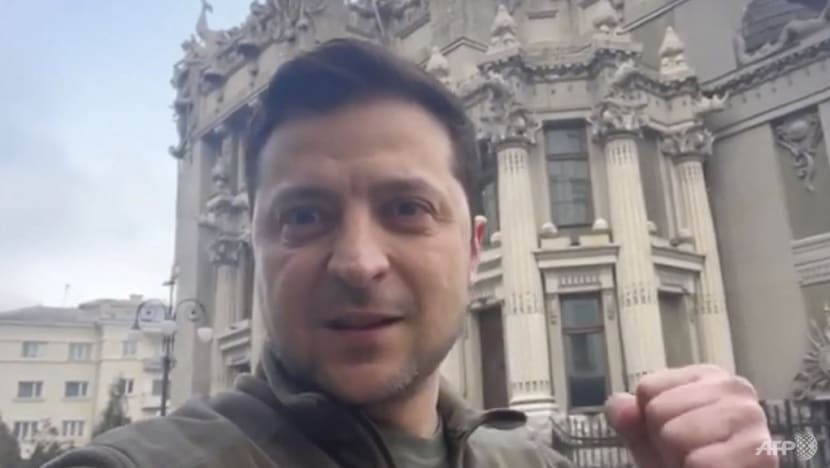Commentary: Dinner with Volodymyr Zelenskyy taught me how hate can be subverted
An encounter with Ukrainian president revealed an unconventional yet charismatic style that has come to define his inclusive leadership and progressive vision of the nation’s identity, writes the Financial Times' Gillian Tett.

Ukrainian President Volodymyr Zelenskyy was the voice of Paddington Bear in the country’s release of the film. (Photo: YouTube)
LONDON: The haggard face of Ukrainian President Volodymyr Zelenskyy has been all over the news in recent days. The courage that he has displayed since Russia invaded his country has been remarkable and, given his past life as a comedian, surprised many.
Yet, when I see his picture, another image jumps into my mind.
Three years ago, I attended a conference on political economy in Kyiv, where Zelenskyy was scheduled to deliver an after‑dinner speech. I turned up expecting a sober discourse about policy, similar to the one given by his predecessor Petro Poroshenko the previous year.
Instead, Zelenskyy, who came to power on a populist, anti‑establishment ticket, embarked upon a surreal double act in which he played the role that he had held before becoming president – that of the fictional president in the hugely popular Ukrainian TV show Servant of the People.
To make matters even more bizarre, his interviewer was “played” by the actor who’d replaced Zelenskyy in the show.
Then, as the dinner crowd of economists, diplomats and business leaders watched in amazement, the two swapped roles – and Zelenskyy, the actual president, interviewed his fictional counterpart, cracking jokes like, “If the UK doesn’t want to be in the EU, can we take their place?”
TAKING THE LESSONS OF BEING A COMEDIAN INTO THE PRESIDENCY
Some onlookers were baffled. But it was wonderfully fun. And when I chatted with Zelenskyy later, he bubbled with impish delight at having subverted the traditional image of a political leader.
“Zelenskyy on geopolitics [that night] was just making us laugh,” recalls Ursula Woolley, a friend and Ukrainian expert who was also at the dinner. “But underneath, it was serious then – and it is entirely serious now.”

The reason, she explains, is that “in Moscow, spin doctors used postmodern ideas to mess with people’s minds, disempower the public and help control politics. In Ukraine, postmodernism is more about surreal humour, creative resistance to invasive Russian autocracy and moving way beyond 20th-century identity politics.”
Today, with the country under attack and Zelenskyy in acute personal danger, this seems to encapsulate a broader point about why the wider world needs to support Ukraine in its current fight.
A MODERN UKRAINIAN IDENTITY
What the country’s leadership has battled to create in recent years is a vision of a fledgling nation that subverts many traditional Soviet norms and “nationalism”.
This has not been easy, as I first realised myself in the 1980s, when I studied Russian in Moscow before enrolling in a PhD exchange programme to study Soviet cultures.
Back then, my language teacher declared that the roots of the word “Ukraine” came from two Russian words: u (“by” or “at”) and krai (edge/corner/ limit) – literally “at the edge”.
Reflecting a legacy of imperialism, she thus presented Ukraine as “the borderlands” of the Russian world, an idea Putin has taken to horrific extremes.
I later realised how offensive that “border” tag was. People living in Ukraine view it as a country in its own right. Indeed, the modern Ukrainian government actively discourages using the word “the” next to its name. And, insofar as Ukraine sits “on the edge” of anything today, they increasingly want this to be Europe.
Or as Andrii Khlyvniuk, the Ukrainian rap star, observed this week: “They (the West) need us as the shield to protect” the values that the west and Ukraine uphold, such as “equal rights for all, rule of law… (and) human rights above all."
This creates a different sense of nationhood from many other former Soviet republics. Putin’s vision of Russian nationalism is authoritarian, exclusionary and ethnically defined. Ukraine might at times have drifted that way too; as elsewhere in Europe, its history featured bouts of violent racism and anti-Semitism.
A MULTICULTURAL IDENTITY
But Zelenskyy’s elevation reflects new currents. He is Jewish and a native Russian speaker, whose initially less-than-perfect Ukrainian was mocked by Poroshenko on the campaign trail.
When the Ukrainian government tried to restrict Russian language films a few years ago, Zelenskyy opposed the measure, I was told. More recently, his government has tried to avoid demonising its opponents.
This week, the Ukrainian ambassador to the UN expressed empathy for the Russian soldiers dying in Ukraine. Last week, Zelenskyy released an impassioned YouTube address where he argued it was wrong to say that Ukrainians “hate Russian culture”.
“How can one hate a culture? Any culture?” he asked. “Neighbours always enrich each other’s cultures.” This is as postmodern as the dinner skit.
A cynic might argue that these inclusive ideals may yet crumble amid the brutality of a Russian invasion. I desperately hope not. A nation that exists “on the edge” is a good beacon for liberal values in a globalised age, as is a leader steeped in comedy who knows that humour can soften hate. They both deserve our help.














